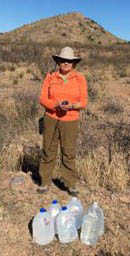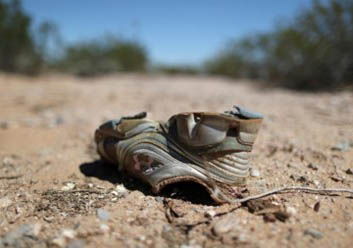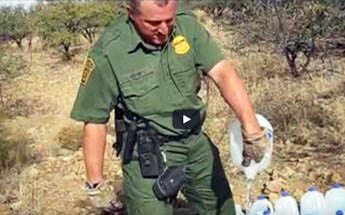|
|
|
|
The weekly newsletter of the México Solidarity Project |
|
|
|
Each Bulletin issue online at mexicosolidarityproject.org |
|
July 13, 2022/ This week's issue/ Meizhu Lui, for the editorial team |
|
|
Walking in the Valley of the Shadow of Death |
|
Late last month we learned about the horrific deaths of 53 migrants trapped in a truck in Texas. Many more migrants are dying walking through the Arizona borderlands. With the escalation of the border wars, the casualties are mounting. The US border has three dimensions. To the first, the classic “line in the sand,” has come a second: an ever-increasing height as walls at the border rise higher and higher. And the latest dimension: an ever-expanding width. The US Border Patrol now holds jurisdiction 100 miles in from every single side of the nation. Two of every three US residents, the ACLU figures, now live within that 100-mile border belt. Count within that belt the entire state of Michigan, where the veteran activist Mary Ann Kopydlowski, our Voices interview spotlight this week, grew up. “Yea, though I walk in the shadow of death,” says the 23rd Psalm, “thy rod and thy staff they comfort me.” The people of Christian faith who started the humanitarian group No More Deaths have been acting as that rod and staff, shepherding migrants to safety since 2004. If only all Christians, including all those who say they want to make the United States a “Christian nation,” would remember the love-one-another edict these activists hold dear.
We’d all like to live, as the lovely psalm suggests, “in the shadow of death” and “fear no evil.” We’d all like to live in a world without want, a world without fear, a world of goodness and mercy. Amen. |
|
|
|
Don’t miss an issue. Subscribe to the weekly México Solidarity Bulletin! |
|
|
|
|
The ‘Deterrence’ That Only Succeeds at Killing |
|
Mary Ann Kopydlowski grew up in a Michigan working-class family. She’s worked as a nurse on a Navajo reservation and cared for the homeless in Boston. She’s also been active in struggles for Central American solidarity and gay rights. Kopydlowski feels she has a responsibility to use whatever skills she has to fight back against current US immigration policy. She explains why in this updated 2020 interview we did with her. You’ve been volunteering with No More Deaths and the Tucson Samaritans. How did these humanitarian aid programs get started?
Mary Ann Kopydlowski: In the early 2000s, people who lived near the border came across human remains and items left behind like discarded backpacks, clothing, and toothbrushes. They found it horrifying to be hiking in the desert for fun while others were hiking as a matter of life and death. They discovered and mapped a trail system used by the migrants and then started carrying in water and placing the jugs at key points. |
|
|
|
Photo: Lucy Nicholson/Reuters |
|
It’s estimated that thousands have died on the Arizona/Mexico border. What makes the Sonoran Desert such a killer?
The border wall! It forces migrants to cross away from towns and spend days walking through remote areas of the desert. If you're fleeing violence, you can’t choose what time of year to go, so you can end up experiencing extreme heat or bitter cold. You face scarce and polluted water sources, treacherous topography, and near-total isolation from possible rescue. |
|
Sometimes the people in a migrant group will get rushed by Border Patrol helicopters. They’ll panic and scatter, causing some to get separated from others and become lost. US officials purposely cause more deaths to stem migration. They call their failed policy “prevention through deterrence.” This “deterrence” has not stopped people from fleeing, but it does succeed in killing. No More Deaths also runs a desert camp/first aid station. Did your experience as a community nurse prepare you to provide care? Migrants routinely suffer everything from sprains and dehydration to blisters that turn into wounds. They also face exposure, heat, and disorientation from vast and remote expanses of wilderness. The No More Deaths camp sits 11 miles from the border, and it’s still a 65-mile walk to Tucson.
My work as a visiting nurse and at Boston Health Care for the Homeless gave me the skills and confidence to work independently without any medical infrastructure around me. And I had learned a lot about foot care, something always needed in the desert. Has the situation for migrants changed any over the years? From no barriers, except the desert itself, came fences first and now walls. Border agents used to consider programs run by Catholics sanctuary spaces, and they left aid stations alone. But not under Trump ― or Biden. |
|
In 2020, in the No More Deaths camp, in less than two months we had 30 people arrested while they were getting medical help, and 12 more were rounded up. The Border Patrol tries to sabotage aid efforts. Activists with No More Deaths took a video of an agent mocking them as he dumped out gallons of life-saving water. Volunteers have also been arrested and prosecuted for acting on their humanitarian values. |
|
|
Has witnessing the inhumanity of US policy been a soul-killing experience?
I’ve met people who moved to Arizona to relax in retirement, but the situation of the migrants passing so close to their homes motivated them to devote themselves to giving aid. I’ve met young people from all over the country who move to Arizona to volunteer. People like these give me hope of a time when human needs take priority over the needs of capital. |
|
|
The New York Times Smear of López Obrador |
|
Bourgeois media outlets have always played an indispensable role in US efforts to maintain dominance over Latin America. The latest example: a prominently featured July 5 New York Times article suggesting that US ambassador to Mexico Ken Salazar has become much too cozy with Mexican President Andrés Manuel López Obrador. |
|
The piece claims that ambassador Salazar is giving dangerous credence to the notions that fraud warped the 2006 Mexican presidential election and that the US-funded NGO Mexicans Against Corruption and Impunity is today engaging in partisan work. López Obrador has frequently leveled both these charges. |
|
|
The authors of the Times piece, Natalie Kitroeff and Maria Abi-Habib, incredulously marvel that Salazar would even entertain these thoughts. Yet both these views have, in fact, become mainstream inside México after years of brazen election manipulation by the PRI, the nation’s corrupt long-time ruling party, and years of political manipulation by US agencies and their proxies.
What Kitroeff and Abi-Habib should be incredulous about: the claim that, before the current Morena government, México went 70 years with “democratic” one-party rule!
If we’re being generous, this particular Times story can serve as a good example of how little foreign journalists understand México. But many of us see a more insidious truth.
US policymakers and politicians have been fuming about AMLO’s decision to skip the recent Summit of the Americas in Los Angeles — because Washington refused to invite all the nations of the Americas. Kitroeff and Abi-Habib based their story all on anonymous sources in Washington. That suggests a deliberate planting of the story as part of a broader effort to besmirch López Obrador as a supposed enemy of democracy.
Indeed, only a few weeks before the Times story appeared, US Senator Bob Menéndez had published an opinion piece arguing that AMLO, by opposing the exclusion of Venezuela, Cuba, and Nicaragua from the Summit, was aligning himself with the hemisphere’s “dictators.”
The effort to construct a narrative that López Obrador has autocratic tendencies neatly discounts his massive election mandate in 2018 and his continuing level of popular support, a level among the highest of any leader in the world. This effort serves only the interests of a US imperialism that seeks any excuse to intervene in the internal affairs of the countries of the Americas. Objective reporting? I think not. |
|
José Luis Granados Ceja, a Mexican freelance journalist, is currently studying human rights and popular democracy at the Autonomous |
|
|
|
Recent news reports and commentaries, from progressive and mainstream media,
AMLO defends US ambassador after report suggests his days may be numbered, México News Daily. A New York Times report on Ken Salazar and AMLO’s “cozy ties” may be a not-so-subtle message to the US envoy to resign.
Yulissa Camacho Mora, El New York Times estalla contra Ken Salazar por cercanía con AMLO, Polemón. El texto da a entender que cuando Salazar asumió su cargo en septiembre de 2021, fue enviado a México para “ablandar” a AMLO, pero resultó que que ablandado resultó ser él.
Will Higginbotham, ‘It’s hugely symbolic’: the Mexican artists reclaiming the meaning of piñata, Guardian. A growing number of Latino artists are using piñatas to make pointed social and political commentary.
Ángeles Mariscal, Miles se movilizan en Chiapas contra crimen organizado, Aristegui. También se manifestaron a favor del sacerdote Marcelo Pérez, quien es señalado de ser copartícipe en la detención y desaparición de 21 personas en el municipio de Pantelhó.
Texas Governor Abbott doubles down on illegal border stunts, daring a federal showdown, Border/Lines. How Abbott is pushing the envelope on what states can attempt in the name of “enforcement.”
Carlos Montesinos, Horario de verano: AMLO envía iniciativa para eliminarlo por ser dañino para la salud, Indigo. AMLO envió la iniciativa para eliminar el horario de verano puesto que este genera afectaciones de salud y no representa los ahorros energéticos y económicos que eran su objetivo. |
|
|
The Mexico Solidarity Project brings together activists from various socialist and left organizations and individuals committed to worker and global justice who see the 2018 election of Andrés Manuel López Obrador as president of México as a watershed moment. AMLO and his progressive Morena party aim to end generations of corruption, impoverishment, and subservience to US interests. Our Project supports not just Morena, but all Mexicans struggling for basic rights, and opposes US efforts to undermine organizing and México’s national sovereignty.
Editorial committee: Meizhu Lui, Bruce Hobson, Bill Gallegos, Sam Pizzigati, Courtney Childs, Victoria Hamlin, Agatha Hinman, Steven Hollis. To give feedback or get involved yourself, please email us! |
|
|
|
Web page and application support for the México Solidarity Project from NOVA Web Development, a democratically run, worker-owned and operated cooperative focused on developing free software tools for progressive organizations. |










